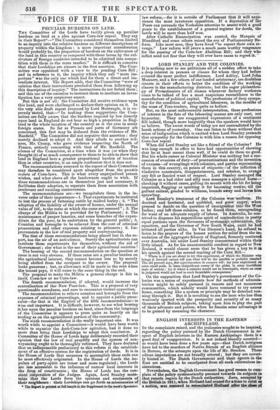LORD STANLEY AND THE COLONIES.
It is nothing new to see politicians all of a sudden affect to take a deep interest in persons or classes for whom they had before evinced the most perfect indifference. Lord Ashley, Lord 'John Manners, and a few others of our landed aristocracy, are doubtless sincere in their efforts to better the condition of the working classes in the manufacturing districts; but the eager philanthro- py of Protectionists of all classes whenever factory workmen come to be talked of has a most suspicious resemblance to the manufacture of political capital. The professions of deep sympa- thy for the condition of agricultural labourers, in the mouths of the mass of Free-traders, ring quite as hollow.
But, on the most unfavourable interpretation, these professions
of interest in the fate of the labouring masses are only cant, not hypocrisy-. They are exaggerated expressions of a sentiment felt indeed, though more languidly than the speakers would have us believe. The sweet words of today are not contradicted by the harsh actions of yesterday. One can listen to them without that sense of indignation which is excited when Lord Stanley pretends that sympathy for the Colonies is with him a reason for opposing Corn-law repeal.
When did Lord Stanley act like a friend of the Colonies? He
was long enough in office to have had opportunities of showing that he at least meant them well, if he could do them no good. But his whole career as Colonial Minister was nothing but a suc- cession of evasions of duty—of procrastination's and the invention of excuses—of wranglings with colonists, and parties representing them in this country, on points of etiquette—of the infliction of vindictive constraints, disappointments, and rebukes, to avenge any felt or fancied want of respect. Lord Stanley managed the Colonies as a bad rider and silly man manage,sn spirited horse— checking it without cause, galling its mouth with the bit for being impatient, flogging or spurring it for becoming- restive, till the gallant animal, goaded to wildness, bounds away and leaves him sprawling. Lord Stanley's treatment of the Colonies was- uniform. He doubted and hesitated, and quibbled, and grew angry, when pressed to decide on the question of immigration into the West Indies ; and left those colonies, as he found them, retrograding for want of an adequate supply of labour. In Australia, he con- trived to dispense his supercilious spirit of contradiction in pretty equal portions upon the favourers of systematic colthailation,, the squatters, and the Governor of New South i Wales until lie had irritated all parties alike. In Van Diemen s Land, he refused to listen to the prayers of the honest settlers for relief from the in undation of the aggregate felonry of England, formerly scattered. over Australia, but under Lord Stanley concentrated Within their little island. As for his unaccountable conduct in regard to New Zealand, it would almost seem that he has given a key to it ia his speech against the second reading of the Corn Bill— "Vi ere is it you are about to try this experiment, of Which the Minister whe brings it forward cannot tell you what will be the possible-or probable results t The old proverb says,fult experimenturn in corpore viii: try your eitperiment on some small scale, in some insignificant corner of the globe, in some martificild state of society; try it where a mistake would not be irrevocable, where an craw
in judgment would not lead to such formidable consequences." ,
On the supposition that Lord Stanley's government of theCo- lonies was a series of experiments how far methods of adminis- tration might be safely pursued in remote and not numerous communities, which nobody would have ventured to try nearer home, something like a system or principle may be detected run- fling through it. But it is revolting to see the man who has thus wantonly sported with the prosperity and security of so many thousands of British subjects, taking upon him to play the part of their advocate and patron, when he fancies some advantage it to be gained by assuming the character.










































 Previous page
Previous page